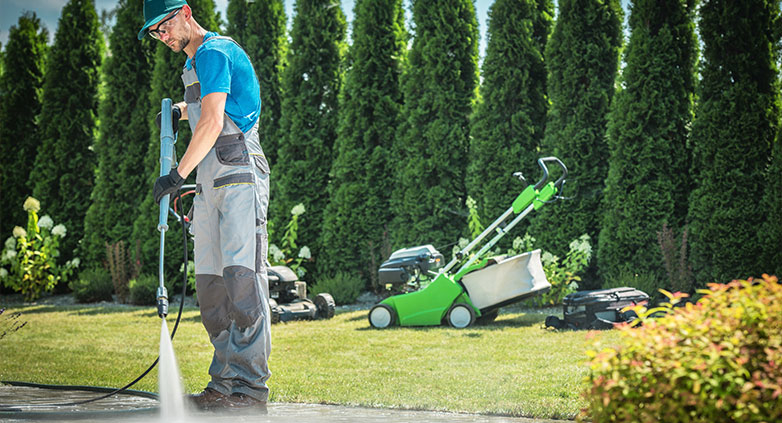How to Clean Pavers – Tips for cleaning patio or driveway
If your pavers on your driveway or patio are starting to look old and worn, they might be due for a cleaning.
There are plenty of effective ways to clean pavers, which can save you hundreds if not thousands of dollars on potential replacement costs in the long run. They include pressure washing, dish soap and Simple Green.
Come dive in with us as we explore how you can clean and revitalize your pavers to get them looking brand new.
Effective Ways To Clean Pavers
The first thing you need to do is determine how you want to clean your pavers. There are many effective methods you can use to bring your pavers back to life. Let’s go through a few.
Pressure Washing
One of the most popular ways people approach cleaning their pavers is with pressure washing. You can use a pressure washer to break down any buildup or get rid of tough stains. All kinds of things can leave stains on your pavers over time, including dirt, debris, grass, and leaves.
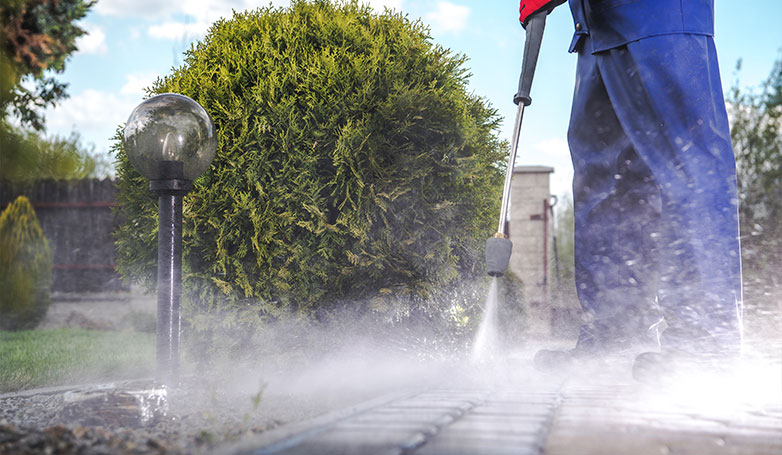
Related Articles:
- Asphalt Driveway Maintenance and Care
- Driveway Paving Cost Calculator
- Sloping Driveway Drainage Solutions
Dish Soap
One gentle way to approach cleaning your pavers is with dish soap. One reason you might choose to use dish soap is if you don’t want to remove decorative texture or sand. We recommend using gentle dish soap or degreaser, such as those made by Dawn.
Start by mixing your dish soap with water in a small container and use a rag to lightly scrub away any dirty stains on your pavers. If a rag isn’t doing the job, you can also use the coarse end of a sponge or a bristled brush.
White Vinegar and Water
One natural method for touching up paver stones or concrete pavers is using a mixture of white vinegar and water. When you spray your white vinegar and water mixture on your pavers, you’ll want to let it sit there for an hour or so. After an hour, you can use mild dish soap and water to scrub it clean.
Simple Green
One of the great things about Simple Green is that it does not use any harsh chemicals. This near-natural solution can get rid of stains and dirt without ruining or discoloring your stones.
Sweep
Though you only have to power wash your pavers once every year, we highly recommend sweeping them as often as you can. This is one of the best ways to regularly remove dirt from your pavers and keep them from staining.
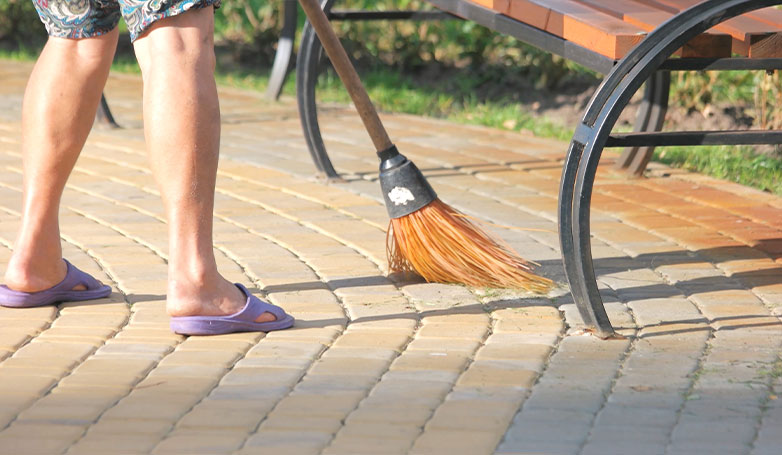
More Like This:
How To Clean Different Types of Pavers
Concrete
When it comes to concrete pavers, one of the most popular cleaners is hydrochloric acid. This heavy-duty cleaning solution is incredibly effective at removing concrete stains, especially in thick concrete driveways. This solution gets into the binder in concrete pavers and dissolves the acid on contact. While it does a fantastic job at making concrete look super clean, it can also ruin your pavers.
If you don’t need a very aggressive clean, we recommend using detergents or less-aggressive cleaning solutions.
Brick Pavers
Brick is probably the one exception when it comes to most patio pavers, as it needs to be cleaned more than once per year. It is very porous in nature, meaning it takes on stains much more easily. You may need to spend more time cleaning your brick if you want it to retain a clear and clean color.
You can use any of the solutions listed above, though try and clean every few months if possible.
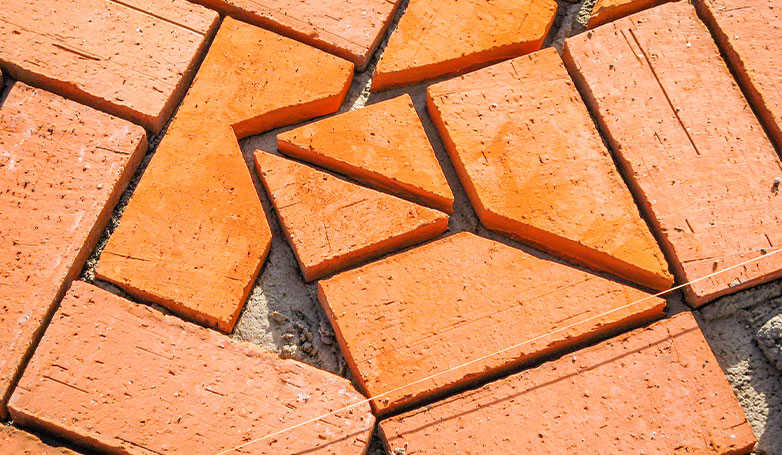
Natural Stone
When cleaning natural stone pavers, it’s important to avoid using harsh chemicals at all costs. There’s no faster way to damage natural stone pavers than by using chemicals that are very acidic or abrasive. If you need to treat stubborn stains on your natural stone, we highly recommend going with a vinegar and water solution or a light detergent.
Further Reading – What Driveway Materials Should I Consider For My Next Project?
Things To Avoid When Cleaning Pavers
When cleaning pavers, there are certain things we often see people do that end up doing more harm than good. If you want to keep your patio or driveway pavers clean year-round, here are a few things to avoid when you want clean pavers.
Using Abrasive Cleaning Solutions
The last thing you want to do when trying to keep your pavers clean is using an abrasive cleaning solution, such as bleach. There are many kinds of pavers, such as concrete pavers, that don’t take too well to acidic cleaners. If you’re using concrete pavers, marble pavers, limestone pavers, or other pavers with large doses of calcium, avoid using highly acidic cleaners at all costs.
Using Steel Brushes or Wire
There are certain materials that don’t take too well to wire or steel brushes. When it comes to cleaning natural stone, we recommend avoiding these kinds of tools if you can. For example, if you try and treat sandstone or limestone with a steel brush or wire, you can end up damaging the top layer.
Not Paying Attention To Decorations
If you have plants, pots, water fountains, or other kinds of decor on your pavers that can leave mold or mildew residue, it’s important that you’re consistently cleaning around them to avoid getting stains on your pavers. Make sure to regularly lift up your decorations and clean underneath them.
As a side note, if you ever notice water pooling on your pavers, make sure to clean it up immediately. Pooling water can leave dark stains that can be very difficult to treat down the line.
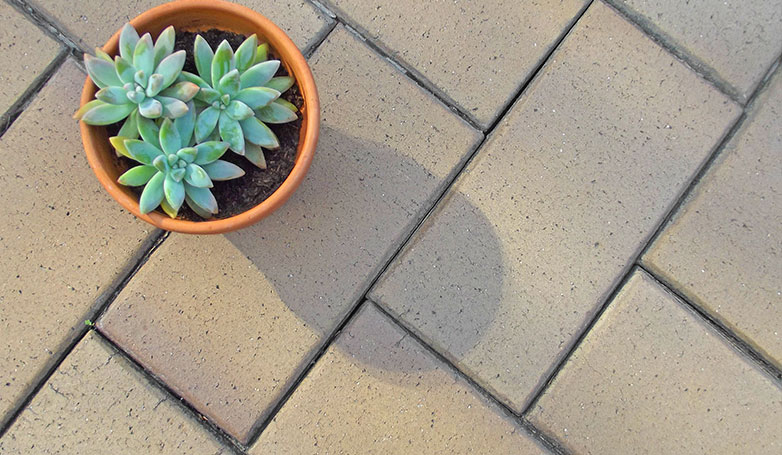
See More:
Final Thoughts
If you want to make your pavers look brand new again, we recommend cleaning them at least once per year, following our recommendations above. To get rid of pesky stains and mold or mildew growth, one of our favorite natural solutions is mixing white vinegar and water. Not only will it leave your pavers looking fresh and new, but it’s also good for the environment.
We hope that this article was helpful! Make sure to head on over to Paving Finder blog for more expert advice!

